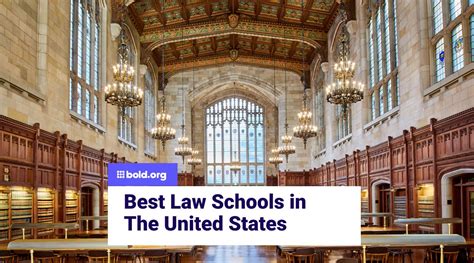Introduction
Aspiring legal professionals embarking on the path to a successful career in law must carefully consider the choice of their law school. With numerous reputable institutions across the nation, navigating the landscape can be challenging. This comprehensive guide will provide an in-depth analysis of the top law schools in the United States, empowering prospective students to make informed decisions.

Methodology and Rankings
The rankings presented in this guide are based on a rigorous evaluation of several key metrics, including:
- US News & World Report 2023 Law School Rankings: This prestigious publication has been consistently regarded as a leading source of law school rankings.
- QS World University Rankings 2023: Law: QS provides a global perspective on higher education, offering valuable insights into international reputation and research impact.
- Emory Law’s 2023 Best Law Schools in the Nation: Emory University’s ranking system focuses on factors such as bar pass rates and employment outcomes, which are crucial indicators of a law school’s effectiveness.
- Above the Law’s Top 50 Law Schools 2023: Known for its legal industry insights, Above the Law highlights schools that excel in areas such as graduate employment and intellectual capital.
- The National Law Journal’s 2023 Go-To Law Schools for Litigation: This ranking specifically assesses law schools’ strengths in litigation, a highly specialized and competitive field of law.
Top 10 Best Law Schools in the United States
- Yale Law School
- Stanford Law School
- Harvard Law School
- University of Chicago Law School
- Columbia Law School
- New York University School of Law
- University of California, Berkeley School of Law (Boalt Hall)
- University of Michigan Law School
- University of Pennsylvania Law School
- Duke University School of Law
Factors to Consider When Choosing a Law School
While rankings provide valuable insights, aspiring law students should also consider additional factors that align with their individual goals and preferences:
- Academic Reputation and Curriculum: The reputation and curriculum of a law school can significantly impact a student’s career prospects.
- Location and Career Services: Consider the geographical location of the law school and the strength of its career services department.
- Faculty and Research Opportunities: The quality of faculty, research resources, and clinical programs can enhance learning experiences and research opportunities.
- Cost and Financial Aid: Tuition fees and financial aid availability can play a crucial role in the financial burden associated with law school.
- Diversity and Inclusion: Law schools with a diverse and inclusive environment can foster a sense of belonging and support.
Benefits of Attending a Top Law School
Attending a top law school offers numerous benefits, including:
- Enhanced Career Opportunities: Graduates from top law schools are highly sought after by prestigious law firms, corporations, and government agencies.
- Intellectual Stimulation and Rigorous Education: Top law schools provide a challenging and stimulating academic environment, pushing students to their full potential.
- Networking Opportunities: Law schools facilitate networking opportunities with faculty, alumni, and legal professionals, expanding career connections.
- Increased Salary Potential: Graduates from top law schools typically earn higher starting salaries and enjoy faster career advancement.
- Prestige and Recognition: The prestige associated with attending a top law school can open doors to future opportunities and enhance professional reputation.
Drawbacks of Attending a Top Law School
It’s essential to acknowledge potential drawbacks associated with top law schools:
- High Cost and Debt: Tuition and living expenses at top law schools can be substantial, leading to significant student debt.
- Stressful and Competitive Environment: Top law schools can create a highly competitive and demanding environment, potentially affecting mental health and well-being.
- Limited Diversity: Some top law schools may have limited racial and socioeconomic diversity, which can impact students’ experiences.
- Geographical Limitations: Top law schools are often concentrated in specific geographical locations, potentially restricting opportunities for students seeking to practice law in other regions.
- High Bar Exam Pass Rates: While top law schools generally boast high bar exam pass rates, they can also create pressure on students to perform under intense scrutiny.
FAQs
1. What is the best law school in the United States?
According to the 2023 US News & World Report Law School Rankings, Yale Law School is ranked number one.
2. What makes a good law school?
Factors that contribute to a good law school include academic reputation, curriculum, faculty, research opportunities, location, career services, and diversity.
3. How much does law school cost?
The cost of law school varies depending on the institution, but it can range from $60,000 to $200,000 per year for tuition and living expenses.
4. What are the benefits of attending law school?
Attending law school can lead to enhanced career opportunities, intellectual stimulation, networking opportunities, increased salary potential, and prestige.
5. What are the drawbacks of attending law school?
Potential drawbacks include high cost, stressful environment, limited diversity, geographical limitations, and pressure associated with bar exam pass rates.
6. How can I increase my chances of getting into a top law school?
Maintain a high GPA, excel on the LSAT, write a compelling personal statement, and participate in extracurricular activities that demonstrate leadership and commitment.
7. What is the difference between a JD and an LLM?
A JD (Juris Doctor) is the first professional degree in law, while an LLM (Master of Laws) is an advanced law degree.
8. What are the alternative career paths for law school graduates?
Law school graduates can pursue careers in law firms, corporations, government agencies, non-profit organizations, and other fields that require legal expertise.
Conclusion
Selecting the best law school is a crucial decision that requires careful consideration of both rankings and personal preferences. Top law schools offer exceptional academic opportunities, career prospects, and prestige, but they also come with potential drawbacks. By thoroughly researching and evaluating the factors discussed in this guide, aspiring law students can make informed decisions that align with their aspirations and career goals.
